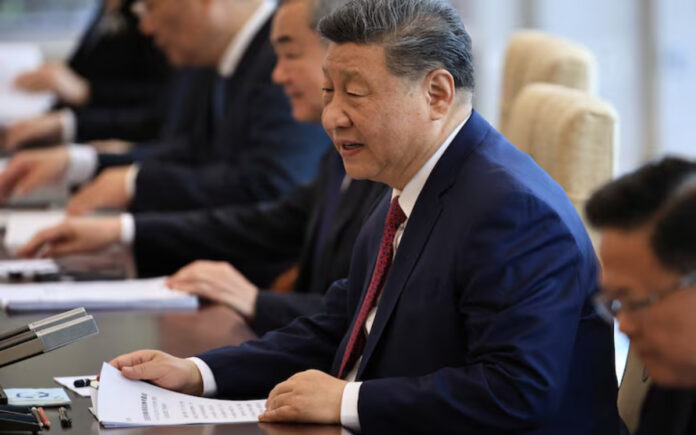Beijing: As tensions escalate in the global trade arena, China is ramping up efforts to strengthen its relationship with the European Union, now the largest accessible market for Chinese exports amid a deepening trade war with the United States. Yet, analysts and diplomats caution that overcoming the longstanding deadlock in Sino-EU trade relations will be far from straightforward.
While China accuses Brussels of resorting to protectionist tactics, the EU and other trading partners have voiced growing concern over Beijing’s industrial overcapacity, warning that the surge in Chinese manufacturing is inundating global markets with surplus goods.
Since U.S. President Donald Trump’s return to the White House and the imposition of sweeping new tariffs, a steady stream of European leaders has made the journey to Beijing. This diplomatic outreach culminated with Spanish Prime Minister Pedro Sanchez’s visit, during which he met with Chinese President Xi Jinping and other top officials.
In Xi’s first public remarks since the new U.S. tariff campaign began, he urged greater cooperation with Europe, telling Sanchez that China and the EU should “join forces to defend globalisation and oppose unilateral acts of bullying.”
Behind the scenes, coordination between the two sides has intensified. European and Chinese officials held two calls on Tuesday to address concerns over trade diversions resulting from U.S. tariffs—an issue both sides recognize could place strain on their commercial ties.
Following EU Trade Commissioner Maros Sefcovic’s late-March visit to Beijing, China and the EU established several economic working groups to address key concerns, such as electric vehicle (EV) supply chain investments and access to agri-food markets. On Thursday, negotiations resumed over setting minimum prices for Chinese-made EVs—a measure Beijing has long supported in hopes of reversing tariffs imposed by the EU last year.
Chinese EV exports to Europe fell by 15% in the first two months of 2025, compared to the same period the previous year, extending a 10% annual decline after the bloc’s new tariffs—some as high as 35.3%—took effect last October, according to the China Passenger Car Association.
Notably, EU Commission President Ursula von der Leyen softened her tone on Ukraine during a call with Chinese officials on Tuesday, inviting Beijing to “intensify its efforts to contribute meaningfully to the peace process,” a marked shift from earlier criticisms over China’s ties with Moscow.
Meanwhile, President Trump on Wednesday reversed tariff hikes on dozens of countries but doubled down on China, raising levies to 145% from 104%, underscoring his confrontational trade posture.
Despite the flurry of engagement, European diplomats remain skeptical of any meaningful reset in trade ties. Years of negotiations have failed to resolve fundamental issues such as market access, reciprocity, and the persistent trade imbalance.
“It’s up to the Chinese to show they’re serious about engaging. All existing problems in the trade relationship are within their power to resolve,” said one European diplomat based in Beijing, speaking on condition of anonymity.
Some analysts suggest that Beijing sees the EU as politically fragmented and hopes Washington’s aggressive tariff regime will nudge member states toward deeper investment cooperation with China.
“I don’t see any reason why China would be interested in a change other than political and symbolic gains—which is not what the EU wants,” said Mathieu Duchâtel, director of the Asia Program at Institut Montaigne, a Paris-based think tank.
A Measured Charm Offensive
In recent months, Beijing has quietly pursued a charm offensive, including sending senior officials to Brussels in February to negotiate lifting sanctions on EU lawmakers—an effort linked to reviving the stalled Comprehensive Agreement on Investment.
During a late March visit to China, French Foreign Minister Jean-Noël Barrot secured a temporary reprieve on punitive Chinese tariffs targeting cognac imports. Yet, according to two European diplomats, China had ignored EU demarches related to cognac for months before resuming engagement.
An EU Commission spokesperson confirmed that top EU leaders will travel to Beijing in July for an in-person summit with President Xi. This followed China’s indication that Xi would not attend the previously scheduled summit in Brussels—a move seen by some diplomats as symbolic of Beijing’s lukewarm commitment to improving ties. One diplomat noted that Xi had instead prioritized a trip to Moscow for World War Two commemorations in May.
“They sense an opportunity for getting concessions, but are not interested in really improving ties since Xi cannot be bothered to travel to Europe,” said the diplomat.
Also Read | Trump’s Pick Dan Caine Approved as Top U.S. Military Officer in Senate Vote
Still, there is guarded optimism that sustained U.S. tariff pressure could eventually compel both parties to make pragmatic compromises.
“In the longer term, if relations with Washington continue to deteriorate, the EU and China may decide that it is in their interests to reduce these tensions,” said Noah Barkin, senior advisor at Rhodium Group.
Spanish Prime Minister Sanchez, in positioning Spain as a potential bridge between China and the EU, hopes to attract increased Chinese investment, despite warnings from Washington that such a pivot would be “cutting your own throat.”
“The U.S.’ current approach has presented China with the opportunity to demonstrate to Europe, and others, that it can be a reliable trade and investment partner,” said Jens Eskelund, President of the European Chamber of Commerce in China.
“The ball is very much in China’s court, and it will be interesting to see how they choose to play.”



